Do Pigeons Eat Slugs?
Pigeons are a familiar sight in urban and rural environments all around the world. These ordinary birds have remarkably adapted to our presence.
While we’ve seen these birdies gobbling up breadcrumbs, crops, and seeds, but here’s a head-scratcher: do pigeons eat slugs?
Pigeons do eat slugs, especially in winter when there is a deficiency of food. But, among all the different species of pigeons, the common wood pigeon (Columba palumbus) is particularly well-known as a slug eater.
Pigeons feasting on slugs is just the tip of the iceberg, there’s more interesting stuff related to it. Interested to know more about their eating habits?
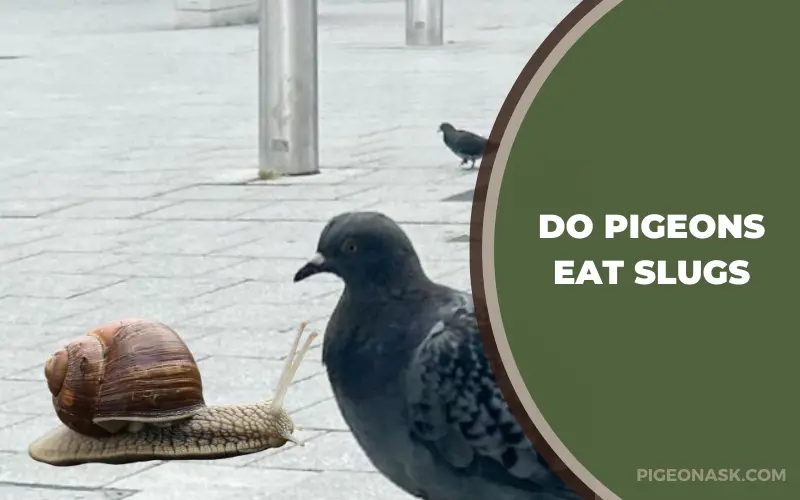
Well, look no further, as this article will provide you with the ultimate insights. Now, let’s dive into their peculiar dietary inquiry.
Looking for more articles about pigeon food:
Do Pigeons Like Eating Slugs?
Pigeons exhibit a versatile palate. But when it comes to slimy creatures like slugs, they are not on the first line of the pigeon menu.
You see, Pigeons are opportunistic feeders. They like to munch on whatever they find around them and keep adapting to the available food sources.
This adaptability raises the common question of whether unappetizing creatures like slugs fall into the diet of pigeons consumption.
Are Slugs a Common Part of a Pigeon’s Diet in the Wild?
In the wild, these adorable birdies are open to manifold food sources based on their surroundings, where they consume stuff like grains, berries, seeds, nuts, vegetables, peas, and so on. Over 100 types of crops are part of their regular diet menu.
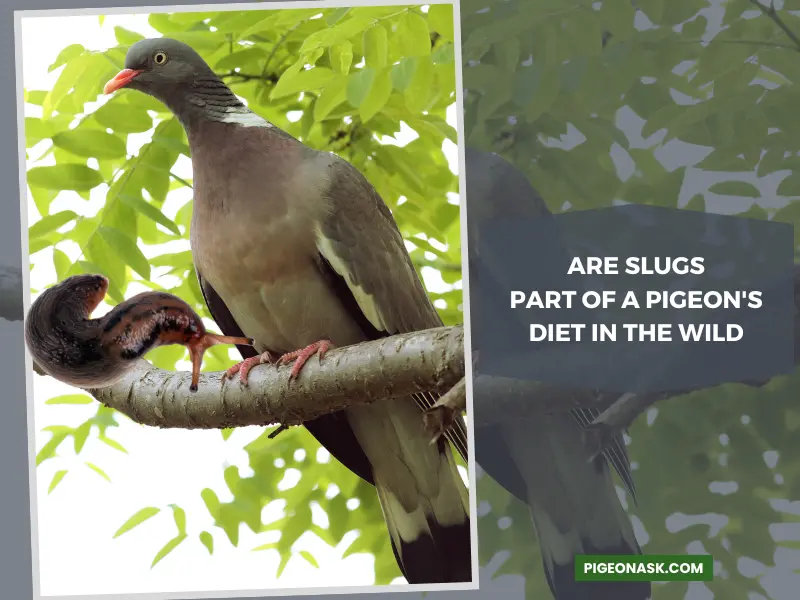
However, during the harsh winter season of Europe, when most areas, plants, and vegetables are covered in snow, there’s a shortage of food for every animal and bird.
So, pigeons have to go against their common eating habit and consume whatever is easier to find.
In this case, slugs are one of the easiest prey. Though studies regarding slug-pigeon interaction are limited, observations prove that they occasionally feed slugs as their alternative food source.
See our in-depth “Pigeon Foods and Diet” article to learn what these urban birds eat. We cover their dietary habits and nutrition.
Are Slugs Safe for Pigeons to Eat?
Before answering this question, first, you need to know what a slug really is. Slugs are little slimy creatures, a familiar name for any shell-less terrene gastropod mollusk usually found in damp places like fallen logs, under tree bark, rocks, etc.
So, are they safe for pigeons to feed? Well, it’s a bit of a mixed bag. Though slugs have different health and nutrient benefits, they also come with potential risks.
Are There Any Potential Risks for Pigeons Eating Slugs?
Slugs neither produce any toxins nor have any kind of stings on their body. So, what can be the potential hazard?
Well, as slugs like to live in dampish places, they can harbor various microorganisms like harmful parasites and deadly bacteria sometimes.
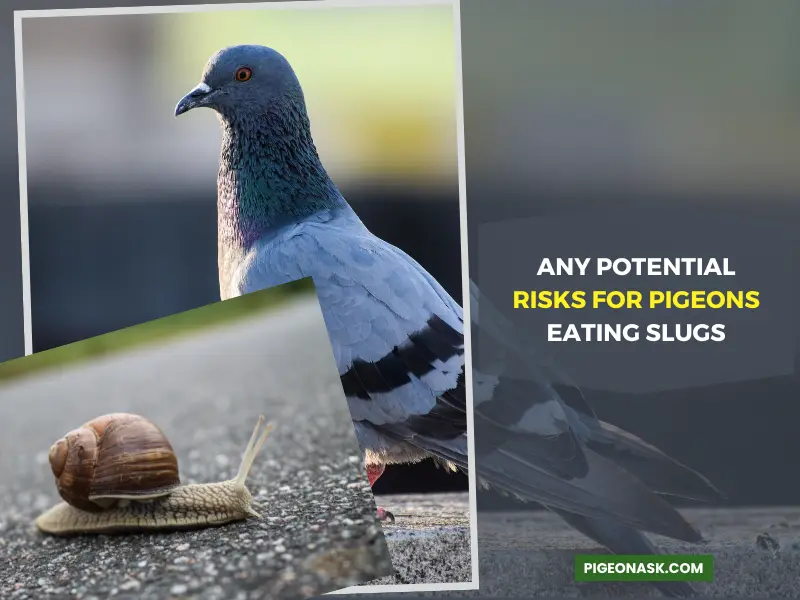
Consuming these unwanted hitchhikers can easily lead to digestive inconvenience and other health issues among pigeons.
Furthermore, slugs generate a slimy compound, which is a combination of mucus and serotonin. This thick mucus makes them distasteful to predators like pigeons. Plus, it can affect the overall well-being of the slug eaters.
What Are the Health Benefits of Pigeons Eating Slugs?
While slugs might not be a typical dietary choice for pigeons, they do consist of certain nutrients that can be beneficial for pigeons’ overall health.
Here are a few health-related advantages of eating slugs for pigeons –
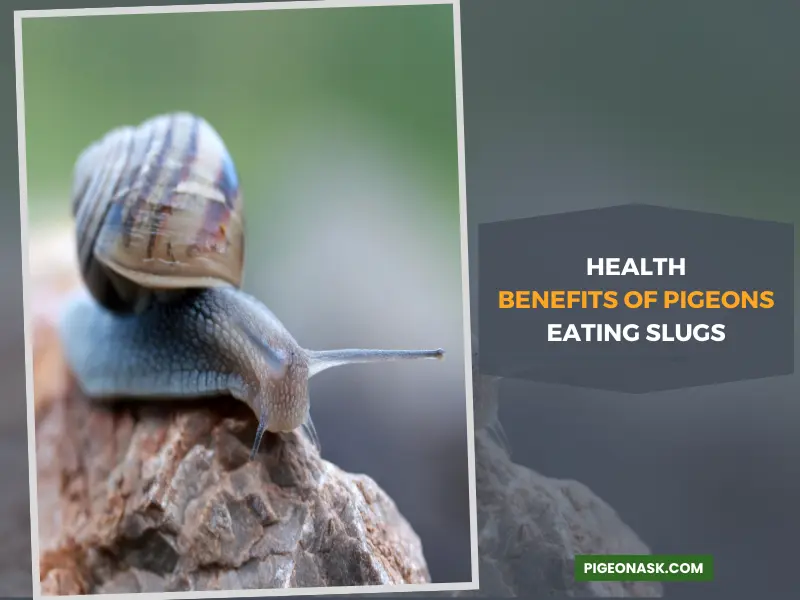
Protein Source
Slugs are a good source of protein. For instance, In 30 grams of slug meat, around 18% is protein, 10% is carbs, and 72% is fat.
Which can be an essential nutrient for growing muscles, repairing tissues, and maintaining health for pigeons. Moreover, feather development and muscle function mostly depend on protein intake.
Most of the time, pigeons meet their protein need by eating seeds and small insects, but during harsh weather, they have to be dependent on slugs and other stuff as substitutes.
Minerals
Necessary minerals like iron and calcium are found in snails and slugs. These minerals play a significant role in bone health, various metabolic processes, and blood cell formation within pigeons’ bodies.
Fatty Acids
Pigeons’ primary energy source is carbohydrates. However, a small amount of fatty acid can contribute to their energy balance. As slug meat mostly consists of fats, it can really help with the pigeons’ fatty acid intake.
According to the NCBI (National Center for Biotechnology Information), slugs have polyunsaturated fatty acids in them, which include arachidonic acids (20:4n-6), eicosapentaenoic acids (20:5n-3), linoleic (18:2n-6), and linoleic (18:3n-3).
These components help to keep pigeons in good shape and provide them the energy to flutter around.
How Often Should a Pigeon Be Fed Slugs?
If you are willing to feed your pigeon pals some slimy snacks, pause for a second and hear us out.
First off, slugs aren’t exactly the go-to gourmet meal for pigeons. Although they have health benefits, they most likely carry some not–so–friendly stuff that could make your pigeons feel under the weather.
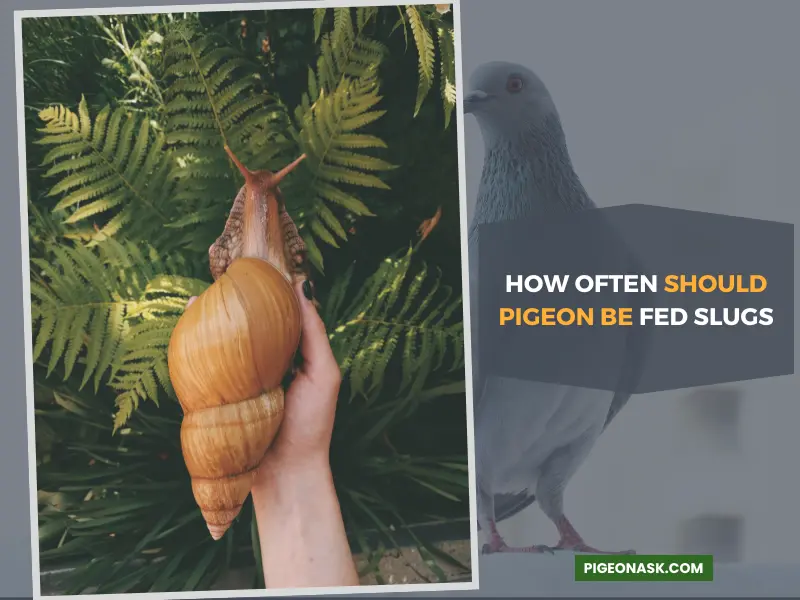
So, what’s the golden rule? You should treat your pigeons with slugs occasionally. Just don’t make them an everyday menu item.
Pigeons are like us. They mostly enjoy a balanced diet with a variety of foods. So, too many slugs at once can lead to tummy troubles and worse fatal illness.
Let them stick to their usual favorites, as they have natural preferences.
Frequently Asked Questions
01. Will pigeons eat snails?
Wild pigeons occasionally eat beetles, slugs, snails, earthworms, spiders, and small insects. But in general, they stick to their predominately vegetarian menu, like roots crops, flowers, fruits, etc.
02. Are slugs poisonous?
Slugs might carry parasites and other harmful stuff, but they are not poisonous at all. They just produce some slimy compounds to save themselves from potential predators like birds, ground beetles, and fireflies.
Wrapping Things Up
That’s all for today. So, do pigeons eat slugs? Yes, they do. But, while the idea of pigeons eating slugs may spark interest, it’s essential to approach this concept with caution.
Pigeons have their own preference for foods, which perfectly aligns with their nutrient needs and digestive system. However, scarcity of food forces them to slug consumption, which is not a major dietary choice for them.
Plus, it comes with possible health hazards.
Anyway, we hope you have found the answer you were looking for. Thanks for staying with us. For more informational articles like this, follow us on Facebook, Twitter, and Pinterest.
